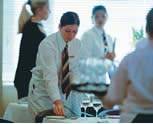Eating Green carbon footpints of your food

FOOD MILES AND CARBON FOOTPRINTS TRAVEL THROUGH MINDS OF GREEN CONSUMERS
Consumers are going beyond energy-efficient light bulbs and enviro bags to reduce their carbon footprint. They are now considering the environmental implications of what they eat, where they dine and the hotels they stay in, says William Blue.William Blue School of Hospitality, Tourism & Leisure Management is a prestigious tertiary college educating students in hospitality management.
"Community focus on climate change is causing individuals to stop and think about the effect their purchases have on the environment," says Jenny Jenkins, William Blue head of school. "Consumers want to know what the organisation behind a product, meal or service is doing to minimise their carbon footprint."
A recent international survey by Planet Ark found nine out of 10 Australians are concerned about the impact climate change will have on the future.* Jenkins says the tourism and hospitality industry needs to cater to these concerns.
"Restaurant, cafe and hotel staff need to be sensitive to the ethical and environmental concerns of their customers. They must have a strong knowledge of their organisation?s environmental policy, as well as how ingredients are sourced and prepared," she says.
In recognition of the emergence of the conscious consumer, William Blue is incorporating more content about the environment and broader issues to give students deeper and wider knowledge than they would have had in the past.
Jenkins says when it comes to food, ?green? consumers want to know the impact each stage of the supply chain has had on the environment.
"How far food has travelled to get to our plate, or ?food miles?, is of growing concern. The further the food has travelled, the higher the level of carbon emissions created and the lower the quality of food."
"For example, if a restaurant uses bananas sourced from Brazil, they would have been picked when green to ensure they survived the extensive journey. This affects the taste and quality of the bananas, as well as racking up significant food miles to get it to the Australian diner?s plate," Jenkins explains.
"Success in hospitality is about more than politely serving a beautifully-presented meal. In addition to basic hospitality knowledge and skills, individuals need to be sensitive to each customer?s interests, feelings and concerns," she says.
"At William Blue, students study all areas of working in the hospitality and tourism industry, from basic food production, service and consumer behaviour to the management of financial, physical and human resources."
"This ensures that they have an understanding of all aspects of the business and can provide customers with information on where a meal?s ingredients were sourced from or how a hotel reduces its greenhouse emissions through its environmental policy," Jenkins concludes.
William Blue School of Hospitality, Tourism & Leisure Management is a part of the renowned Billy Blue College and is located in North Sydney. William Blue?s courses include:
Advanced Diploma of Hospitality Management, which includes:
Advanced Diploma of Hospitality Management - Commercial Cookery.
Associate Degree in Hospitality Management.
Bachelor of Business (Tourism and Hospitality) awarded by La Trobe University.
Australian students applying for the Associate Degree or Bachelor of Business (Tourism & Hospitality) can apply for FEE-HELP.
www.billyblue.com.au.
MORE





